#classical jungian
Text
My full typology

MBTI: INFJ
Classic jungian: IN(F)
Enneagram: 6w5
Tritype: 621
Instinctual variant: sp/so
Temperament: Melancholic-Phlegmatic
Big 5 (SLOAN): RLOAI
Attitudinal Psyche: LEFV (most likely)
Not really sure about the rest rn. I will be adding to the list as I learn
#my typology#mbti#typology#typology stuff#classical jungian#enneagram#tritype#instinctual variant#temperament#big 5 sloan#attitudinal psyche
8 notes
·
View notes
Text
do you think there were fujoshi in the weimar republic. on account of hermann hesse's works
#sorryfjdhfjshfks i'm fixating on the german classic literature yaoi because it's funnier and easier to post on tumblr dot com#as opposed to the deeply thought provoking philosophical themes of his work that make me want to#1) stare at the wall and 2) write a thesis about or something#basically i'm trying to shipbait you guys into reading hesse only for you to be blasted with jungian psychology
21 notes
·
View notes
Note
Hello there!
I'm curious about those four personality classifications in your bio after the mbti and enneagram 🧐 what kind of tests are they? Also yay a fellow leo!! 🦁
Hiya!
1-3-5 is Tritype, sx/sp is Instinctual Varient, ILI is Socionics, IT(N) is Classic Jungian!
Hope this helped ::3
3 notes
·
View notes
Text
what would my man carl jung think of his fandom rn.... half of it is random teenagers who like personality types and the rest is just people who open tiktok and say shit like erm actually people with schizophrenia are activating their third eye yesthank you
#i love classic jungian#but man#the fandom is#something.#carl jung#classic jungian#jungian typology#typology
5 notes
·
View notes
Text
IF(S) — Introverted Feeling supported by Sensing
This is a type that doesn't cry, doesn't whine or lament its own existence. A true stoic and a moralist, he maintains independence from the judgement of others, being bound by inner moral law. He has a strong sense of duty. faithfulness to obligations. and no desire to impress or influence other people, and does not seek to be praised. Loyal and extremely judgemental, only reacts with reasoning and personal feeling-values. Capable of great devotion, sacrifice and service for a loved one, to a purpose, a duty, or to a cause, a societal need, a movement. This type often manifests as an archetypal "thinker" due to its moralistic and cold-blooded nature. But the stoic and robotic version of this type is not the only one that exists: some manitestations of this type are quite non-robotic and extremely sensitive, emotional. Even the robotic versions o this type are deep down sentimental and oriented to idealistic, loyal and perfect love. This type often judges people according to their feelings and morals; its nature can manifest on criticism and perfectionism, prejudices and insults "Hopeless pervert! Useless! You should just die!" or genuine love, soulful support and sympathy. This type generally never breaks a promise and should be the definition of dutifulness, self-discipline, morality and modesty. Of course, this type can be extremely assertive and strong in "metaphysical" ways: it exercises its own power and duty, invading people's life or the world. They wear their warm and vulnerable side inside, like a fur-lined coat. They try to adapt and work with the ambient, they try to keep internal harmony. They want their work to contribute to something that actually matters, and it should matter to them. Some manifestations of this type are open-minded, flexible and supportive, protective and altruistic. Other manifestations are petty, tyrannical, pedantic, never satisfied, always frustrated, envious or jealous, extremely social justice warrior and dominating etc. This type judges a person based on their personal values and always analyses how he relates to the other. I assume that this type has strict ideals of what the perfect partner should be, how is the personality of the partner he will choose, for example. This type focuses on the sentimental and human content, the personality, but also the appearance: they imagine what is beautiful and what is ugly, and they keep those ideals close to their heart. They want to have a purpose behind their paycheck, they want to contribute and be useful for the collective judgement, but they will always follow their own personal feelings. They are perfectionists whenever their feeling is engaged.
This type doesn't complain about their own life but heroically goes through the difficulties and struggles. In dedication, commitment, stability and reliability no other types can compare to this one. What should someone choose - love or duty? This type chooses the later. By this, he often becomes a hostage of their own loneliness with few friends, as potentially interesting people and relationships that don't corresponds to his system of values are quickly dropped from his field of view. Representatives of this type are also at odds with intuition and are capable of showing initiative in an untimely or inappropriate manner. This, in turn, can lead them into trouble - "initiative is punishable". They have a very clear division of people into ‘good’ and ‘bad’. Stranger, familiar. Friend, enemy. They see the realities - the needs of the moment - and try to meet them. Some manifestations of this type are particularly interested and loving of animals (such as cats) and is very sympathetic to things recognized as symbols. They consistently tend to underestimate and understate themselves, and some manifestations may act like the opposite: self-confident or even cocky behavior; prideful, pointing out faults in other people without any consideration of their feelings (this type only reasons according to their own sentiments). Tries to maintain an elegant, noble and dignified appearance, extremely "royal" and adult. Competitive, yet insecure. Compares himself to other people, seeing the relation between him and them, feels either inferior or superior. Loves and symbolizes, idealizes something very specific, but tends to be tsundere - it rejects and hides their love - very contradictory. Prone to over-worrying: he thinks about all the possible outcomes but doesn't know how to deal with the possibilities. Tries to find a specific route, a path to follow; but always gets trapped on a cycle of worry and sadness. Anything this type does perfectly, they take for granted as no great achievement. They are inclined to resent people, bring topics that may ruin the mood. This type sticks to their sense of beauty, their sense of what is appropriate, their feeling-values are all infused with pride, anger or envy. Some versions may impose those personal senses on others, trying to correct them, reform their behaviour, to make people perfect, oriented to concretize their standards. Easily holds grudges and pain, carrying their own suffering their entire life. They have all of these feelings and emotions building up and exploding, but they keep a cold, calm and reserved demeanor. It is either crying or being apathetic. Generally, the people of this type are healthy enough to be kind and selfless. True altruists, always ready to help everyone in need.
This type has a normative attitude to health, when he gets sick he does not panic: "I should go see a doctor", he follows the doctor's advice. "If people do not turn to doctors for help that is their problem". He is conservative in food preferences and sex, any kind of sensation. Usually methodical and rigidly makes the same kind of food, of course, with elegance and perfection, trying to achieve a normal, usual health. It does not take long before the world disturbs his inner harmony again, it is constantly invading his inner psychological realm. This is one of the most anxious types. Acceptance of current circumstances does not always bring the inner peace. Sometimes it is necessary to create new conditions, i.e. instead of accepting the circumstances it is necessary to work with the external situation. It problems persist then he begins to reluctantly work with the circumstances, he even makes attempts to change the course of events. He does it slowly, irresolutely, gradually, but nevertheless he does it. "I want to be this!", "I want to be that!", "I need to do this!", "I want to do nothing!", his vision of the possibilities is all over the place and he can't help but question his own intuition. He considers himself stupid, dumb, he gives up and falls in resentment, says that it is useless, there is no more energy to spend on the topic. Yet he keeps thinking about it, he never stops worrying. This type sees someone and gets skeptical about them: "Are they enemies?". They don't perceive the nature or essence of things clearly. Choosing only one thing is dangerous, making initiatives is dangerous. Innovation is dangerous, so you should keep with your methods, your tactics and ways of being. Those are his conclusions; but they aren't conclusions! He'll think about the topic again, probably. This is the fate of this type, worrying and loving. Relaxing, then hating. Their whole goal is to make the best and the most right choices, they aim to be right. But their open-mindedness doesn't help. They consider all routes, the symbols and signs. They overthink and in the end they do nothing. Certain manifestations may be more calm and non-neurotic, though. Not having things planned ahead creates uncertainty and perfectionism, always. You can't tell this type that you will give them a present in the next future: they will worry about everything! They can't keep their minds closed - their sense of realism and pessimism is always there.
Inspires facts, figures, often misses a deaf ear to all but them. He likes to be in places where knows what the situation is - what to do. Inspires external order of things, which was at the time his upbringing: the political system, social norms, etc. Therefore it is extremely sensitive to social change: as long as the order of things has not changed: "God forbid you live in interesting times." Always moves in the direction of the highest order and places carefully avoids chaos, inspired by the order and very upset that he did not change then. In this connection, sometimes it attracts work in military structures, which has the force of statute. It is important that the situation elsewhere has been organized in accordance with his usual rules and laws do not contradict the facts of objective reality. It is also important to know who and where it should be, what to do. What documents need to collect, for what purpose, where they have to apply and how to fill. Most feel comfortable in a situation of definitive rules of action, without any admixture of subjectivity "in the case of something - to do something-something." Knowledge of the facts is often replaced in a particular situation a true understanding of its problems. Why it becomes superficial, just vault statistics noted by objective laws and regulations. He does not like long and detailed explanations. Immediately interrupts and says, "Well, in short, that there" really? ". There is a view that he wants to get a ready solution, usually, but not its justification. Eg. "2 * 2 = 4" Even rule. Loves terms, sometimes you can just tell them and they they will be enough. He does not like those who are destroying the norms of behavior in some situations, for example, it breaks the chain of command. Particularly inspired by the facts, which sees with his own eyes, if you can touch it. Therefore, it may often become a victim of fraud, which they are able to provide such "fried facts ", especially if it is clearly ("sleight of hand and no moshenstva"). A person is suggested not by explanations but by facts. "Give me the facts." This type does not need "explanations": "Do not explain, just give me the facts, I am not interested in your interpretation!" He considers only real events and proven facts. Suggestion here is possible by means of objective data or something tangible. For example, someone says to him: "Tomorrow we are going to the theatre, here are the tickets!" - "Ok, we are going then." There is no need to tell him about the play, how good the actors are, etc. He expects people to have conventional behavior; she is irritated when people break rules by using any personal relationships or connections. A good place is the place where it is possible to be sure about the authenticity what is going on.
#personality theory#personality types#typology#cognitive functions#jung#classic jungian#if#fi#if(s)#isfp
2 notes
·
View notes
Text
I find Jordan Peterson too funny to really offend me. I disagree with most of what he says and he absolutely blatantly is coasting off Jung and misreading european literature but I also just find him so insane and overdramatic. he's genuinely losing his mind in real time on the public stage. the worst thing he ever did for himself was try to be a public intellectual. I do think he actually cares for people but hes also kanye west level clinically insane and imo a poor scholar (outside of his niche field) he seems so tormented, its like seeing someone in pure agony I'm sure he was an amazing professor. its like he thinks he's Nietzsche but he has no talent or vision just the insanity and misogyny
#he's def a tech bros philosopher and on surface he seems like just another boring edgy classical canon defender#but then you realize this man and his family are living in a vortex of insanity and digital enabling#I think hes probably fine as like a normal jungian psych professor#but now I thinks hes completely degenerating and getting farther and father inside his head
10 notes
·
View notes
Photo
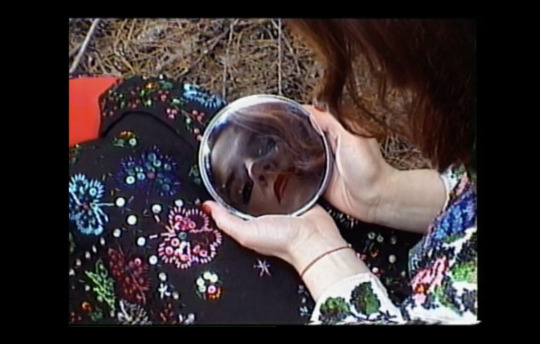





Dumka-Shumka
Analog photographs and still frames from video
2021
Audio-video installation
7min 56s
Ukrainian Rhapsody, Mykola Lysenko (1877)
Reflecting on the issue of identity, I turned this video project to the visual code of the cultural and historical landscape. It’s a story of a performative journey, during which the search for one's self is accompanied by direct experience of tactile dialogue with nature. The path to self-knowledge is reflected in universal natural images - the study of their own origins through touching the roots of trees, achieving the goal through climbing a hill, contemplating the ephemerality of time and the cyclical nature of life by interaction with the river.
Understanding the indivisibility of human and natural processes leads to the realization that self is also a natural organism characterized by cyclicality, change and development. Just as Mykola Lysenko's composition "Dumka-Shumka" demonstrates the relationship between reasoning, inner reflection and active experience, game or dance, so the video encourages to look into the outer horizons and dive into the inner depths of oneself at the same time.
Music performed by V. Petryk and I. Sedyuk
Made as part of the Digital Art Therapy Studio V-Art project
Created with the support of the UCF
#art#video art#analog video#film photography#dumka shumka#ukrainian rhapsody#lysenko#classic music#identity#ukrainian#landscape studies#roots#water#traditional clothing#mirror#jungian#self#krolikowska
2 notes
·
View notes
Text
ok so what do you all think is the most attractive typology (any & all systems)? for science
0 notes
Text
ok prev this is a huge part of why i love homestuck
aside from hussie’s use of platonic forms to construct the world which i think overlays everything basically
It's an approach that resonates with the rest of Homestuck's governing principles involving simple platonic concepts giving rise to greater complexity and chaos
there’s so much thematics and symbolism and symmetry that it’s so like, logically aesthetically pleasing to my brain. you could make a college course on homestuck’s integration of archetypes and typological symmetry (card suits, chess, DNA nucleotides ACGT, western zodiac, alchemy/elementals, the god tier classes and roles). lots of stuff that comes in pairs and even numbers, products of 2 so they can always be divided into halves. everything is symmetrical i swear the structure is so satisfying. it’s quite frankly impossible list it all since some of them encompass other elements within themselves, its like a fucking fractal of duality and 90 degree angle quartets of symbols
is there a name for this kind of symbolic symmetrical dichotomy elements….but not even “dichotomy” is necessarily correct since it often comes in a tetrachotomy too. twos, fours, eights, twelves, sixteens. and always mathematically relating to each other like folding over paper more than once and counting the folds on a single sheet of paper. folded in half once there’s two sides of the single paper. folded again the other way there’s four quarters of a single paper made by two halves (the halving folds themselves split the paper into two sides and there’s two of those folds). though that’s exponential the metaphor still applies
it’s definitely both mathematical and philosophical in nature. four seasons, four temperaments, four classical elements. its present in a lot of philosophy most prominently the yinyang concept and some jungian stuff has it too. like socionics model A also does that logically symmetrical structural relationships shit that i love. its sooo my jam i love you logical patterns and relationships i love you symbolism
idk what im saying or if there’s a term for this im just rambling. if you know what im saying or know of a term for this regarding what im getting at please tell me. im just spitballin whats im rotating in my mind but cant find the words for. fuck i need to talk about this. im not even really trying to make a point about these im just pointing them out
#hs#homestuck#homestuck meta#oh god all the layered symbolism for objects too#like the sun in homestuck especially
185 notes
·
View notes
Note
Hi! Do you have an analysis of hell greastest dad? Do you think it's worth analizing?
Hi!
Yes, I think Hell's Greatest Dad says a lot about Lucifer and Alastor. In particular, I would call it a "set-up song" in how it sets up:
Lucifer and Alastor's foiling
Lucifer's arc in the episode Dad Beat Dad
Alastor's arc (or at least it does some preparatory work)
Future plot-points through foreshadowing
In short, it isn't a song, which pays off immediately and it isn't the thematic heart of the episode (More Than Anything is). Still, it works very well by introducing ideas and conflicts that are postponed. Just like Lucifer and Alastor's rivalry isn't solved because of Mimzy's arrival:
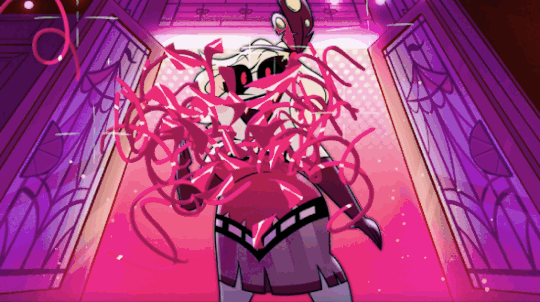
Before I start analyzing the song, here are some metas I am gonna reference in this post:
Alastor and Lucifer's foiling
More Than Anything
An analysis of Alastor
An analysis of Lucifer
LUCIFER AND ALASTOR'S FOILING: DAD LIKE ME
Hell's Greatest Dad is inspired by Aladdin's Friend Like Me.
Some examples:




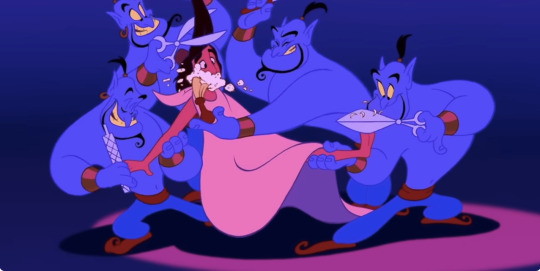

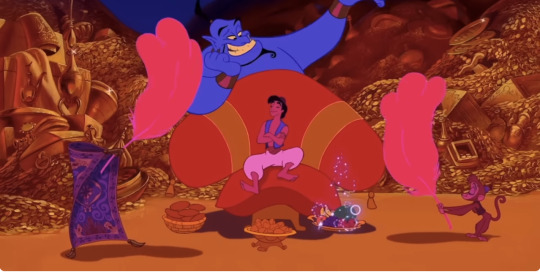

At the same time, it is a twist on the classic Disney song in two ways:
Lucifer is the geenie advertising his selling points, but Alastor, another geenie, comes and picks a fight (1/2)
The two geenies offer different and complementary things (2/2)
LUCIFER AND ALASTOR'S FOILING 1/2: LIGHT AND SHADOW
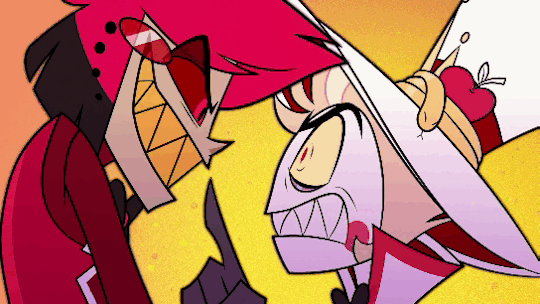
Lucifer and Alastor have opposite motifs:
Lucifer has a light motif, as his name means shining one and his powers use light
Alastor has a shadow motif, as his shadow moves on its own and his abilities employ shadows
This imagery ties with jungian symbolism. According to Jung:
The light is the persona, the mask one wears. It is the part of the self a person shows to others. It is what is out in the open and it is often an ideal image.
The shadow is what's hidden and repressed. It is the part of the self the person is unaware of or ignores. It is often what one dislikes about themselves.
Throughout Hell's Greatest Dad, Lucifer and Alastor's conflicting motifs clash with each other.
Lucifer is surrouned by gold (light):

Alastor has a purple background (shadow):
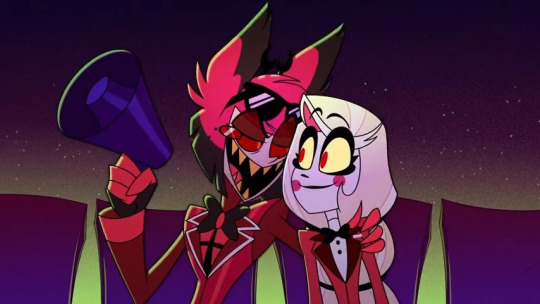
Similarly, Lucifer tries to put off a mask of perfection and power:
Lucifer: Haha! Looks like you could use some help
From the Big Boss of Hell himself
Check out Daddy's glowing reviews on Yelp
Lucifer Muppets: "Five Stars!"
"Flawless!"
"Greater than great!"
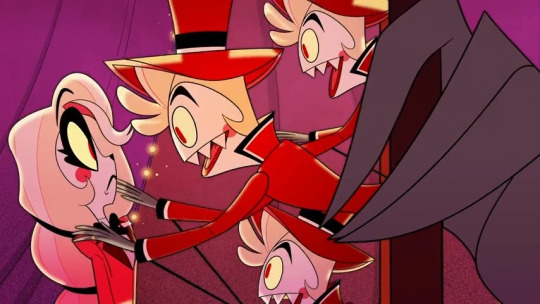
Lucifer shows Charlie his stellar reviews on Yelp, but the ones praising him are Lucifer-puppets. So, the reviews are from puppet accounts and an attempt to look better than what he is.
Alastor instead fights back by using Lucifer's hidden fears and insecurities:
Alastor: I'm truly honored that we've built such a bond
Charlie: Awww!
Alastor: You're like the child that I wish that I had
Lucifer: Uh, what?
Alastor: I care for you just like a daughter I spawned
Lucifer: Hold on now!
Alastor: It's a little funny
You could almost call me
Dad!
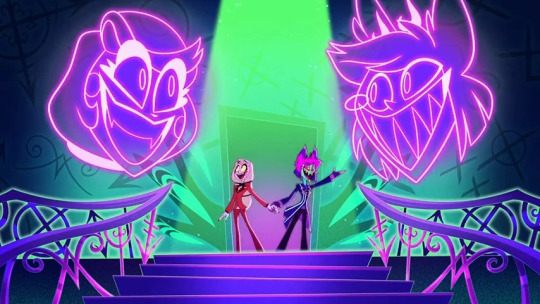
Alastor weaponizes his bond with Charlie against Lucifer. He exagerates his own contributions to the Hazbin Hotel and the closeness he has with Charlie.
At its root, both Lucifer and Alastor don't want to admit they are projecting something on the other.
On the one hand Lucifer doesn't want to face his shortcomings as a father, which Alastor brings to the surface:
Alastor: Sadly, there are times a birth parent is a dud
On the other hand Alastor doesn't want to admit he is envious of Lucifer's powers and freedom (as this episode reveals, Alastor is on a leash):
Lucifer: Who needs a busboy now that you've got the chef?
None of the two can fully overwhelm the other because neither is ready to face himself. This is why the song ends with the unexpected arrival of another character:
t's me!
It's me!
Mimzzzyyyyyyy!
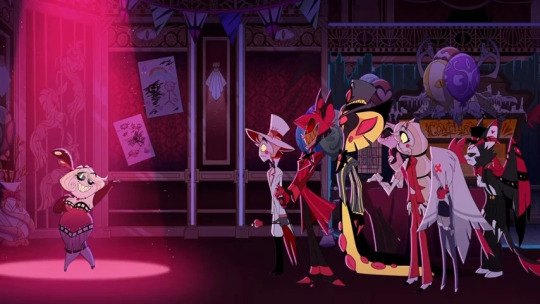
Mimzy's color scheme in the song is purple, like Alastor's. That is because she herself is linked to the shadow. Specifically, she is linked to Alastor's own shadow.
To what he is hiding, like his past:
Mimzy: Oh yeah, we go way back, ran in the same circles when we were alive. You know, this one used to frequent the club where I used to perform. He's the only one I knew who could pound whiskey like a sailor then keep up with me on the dance floor!
To what he is repressing, like his need for validation and attention:
Husk: You and I both know Mimzy only shows up when she needs something. That bitch is trouble, and who knows what kind of demon she fucked with to come running to you this time?
Alastor: it's nothing I can't handle. Don't worry Husker. Who in their right mind would cross me?
In short, Lucifer tries to get Charlie's praise and is mocked for it by Alastor. Still, Alastor himself shares a bond with Mimzy, where he uses his powers to satisfy her requests in exchange of respect. So, Mimzy takes over Alastor's song like Alastor inserts himself in Lucifer's:
Alastor: Can you butt out of my song?
Lucifer: Your song? I started this!
Alastor: I'm singing it, I'll finish it!
Lucifer: OH, YOU TACKY PIECE OF—!
Mimzy: It's me!
Yes, it's me!
I know you were all waiting for me!
To summarize: Lucifer wears a persona> Alastor steps in as Lucifer's shadow > Mimzy arrives to play Alastor's shadow.
LUCIFER AND ALASTOR'S FOILING 2/2: WANT (HEART) VS NEED (MIND)
Lucifer shows all the impossible and fantastical things he could give Charlie. According to him, he could even twist reality for her:
I'll rig the game for you because I'm the ref!
Champagne fountains
Caviar mountains
That's just to start!
Alastor reminds Charlie of all the down-to-earth things he does for her everyday:
Alastor: I'm your guy, your day-to-day
Your chum, your steadfast hotelier
Remember when I fixed that clog today?
Lucifer is the want, whereas Alastor is the need. The Devil is the ideal, while the Radio Demon is reality. Both their approaches are needed in Charlie's quest. She has to dream big, but she has also to be pragmatic and face reality.
She needs both mind (Alastor):
Alastor: They say when you're looking for assistance
It's smart to pick the path of least resistance
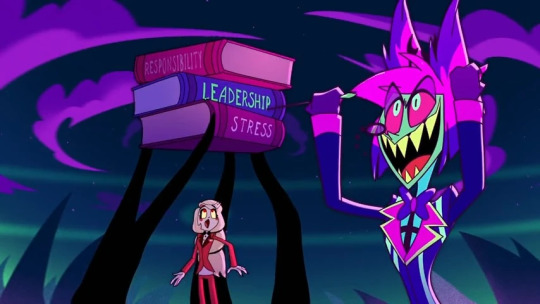
And heart (Lucifer):
Lucifer: Others say that in your needy hour
There's no substitute for pure angelic power!

So, Lucifer and Alastor can fight all they want, but in the end they are both needed by Charlie:
Lucifer is linked to dreams and ideals. He is the legacy Charlie inherits and the biological family she wants to re-connect with. Finally, he is Charlie's guide to Heaven, as he sets up her meeting with Sera and Emily.
Alastor is linked to fear and the unknown. He is the ally Charlie finds by herself and the found family she chooses. Finally, he is Charlie's guide in Hell, as he introduces her to Rosie and helps her inspire the cannibals.
LUCIFER: DEVIL AND ANGEL
Lucifer's arc in Dad Beat Dad can be summarized by juxtaposing Hell's Greatest Dad with More Than Anything.
Hell's Greatest Dad focuses on how Lucifer is the "Big Boss of Hell himself":
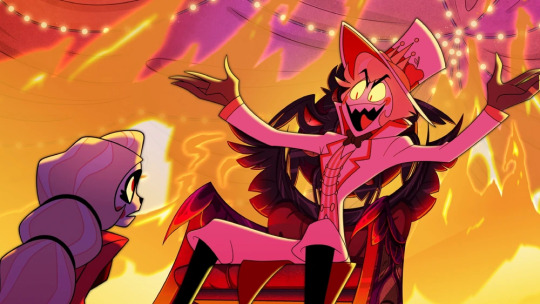
The lyrics reference pacts with the devils, pentagrams and sacrificial lambs:
Oh, with the punch of a pentagram
I wap-bam-boom, alakazam
Usually, I charge a sacrificial lamb
But you get the family rate (thanks dad!)
And the music plays homage to The Devil Went Down to Georgia, with Lucifer playing the Devil's famous golden fiddle:

At the same time, Lucifer is very self-centered throughout the whole song:
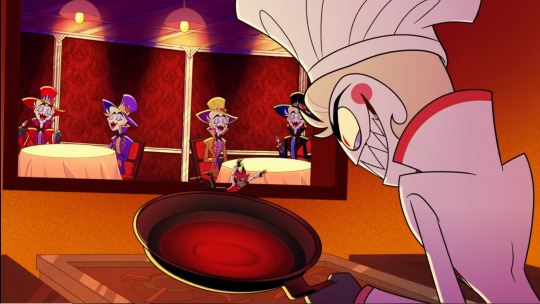
He keeps self-duplicating, as he himself sings how great he is. This ties with the fact he is trying to project an image of power and confidence. He is hiding under a metaphorical rug all his insecurities and flaws. He is repressing the shadow.
However, Charlie doesn't really want the Devil. She needs the Fallen Angel. It is this side of Lucifer that comes out in More Than Anything:
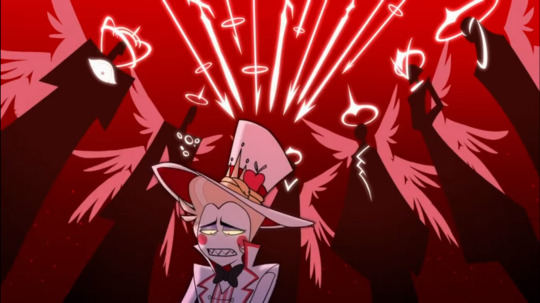
This song explores Lucifer's past as an angel and the pain of his fall. All things he tries to hide out of shame. Still, he shares them with Charlie together with his most genuine self. By doing so, he acts selflessly and puts Charlie's needs and wishes above his own. He puts his daughter at the centre of the scene:
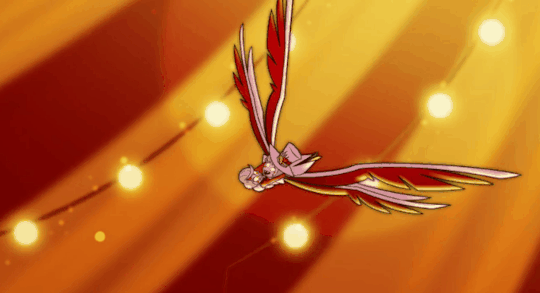
Lucifer shows Charlie his shadow, which actually makes his light stronger:
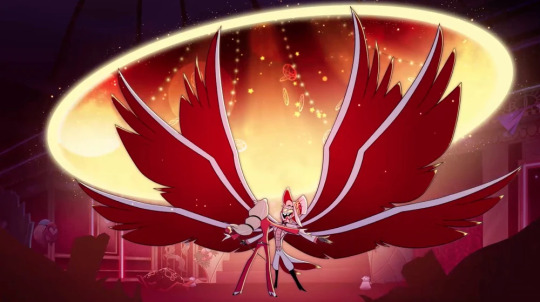
In Dad Beat Dad Lucifer goes from Hell's Greater Dad, where he is linked to fire and demonic symbolism, to More Than Anything, where he is characterized by light and angelic imagery. From want (Champagne fountains, caviar mountains) to need (I'll support your dream whatever lies in store).
ALASTOR: GROUNDWORK
Alastor's part in Hell's Greatest Dad is similar to his role in Stayed Gone. Both times, a powerful demon is singing his song, only for Alastor to come and throw off their groove. Still, there are some differences:
In Stayed Gone, Vox is focused on Alastor to the point his whole performance is a cry for attention from the Radio Demon. Alastor in fact has central stage, as Vox sings about him and to him. In Hell's Greatest Dad instead Alastor is an afterthought. Lucifer is singing to Charlie with some occasional backhanded insult to the Radio Demon. Basically, in the first song Vox is looking for attention. In the second, it is Alastor himself, who wants to be looked at:
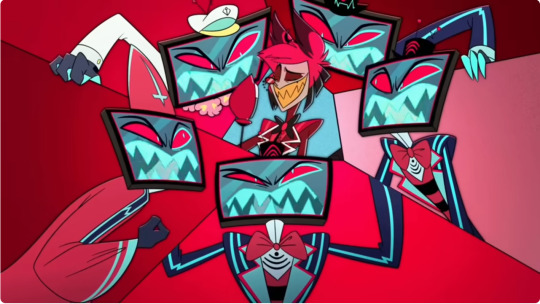
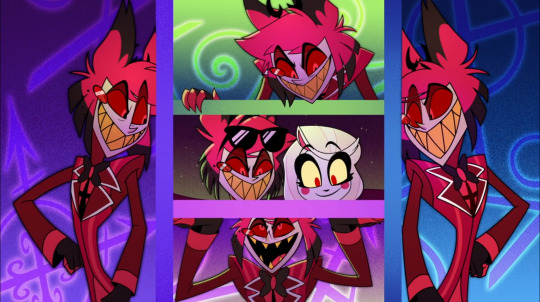
In Stayed Gone Alastor easily takes control of the song and by the end he dominates it. In Hell's Greatest Dad Alastor fails to do the same. Not only Lucifer puts up a fight, but by the end Mimzy arrives and steals the stage. This difference mirrors Alastor's spiral throughout the season. He starts wearing a mask of control, but slowly he reveals himself as controlled. This progression is shown in his songs. He dominates Stayed Gone, he fails to take over Hell's Greatest Dad and he loses his control in the Finale:
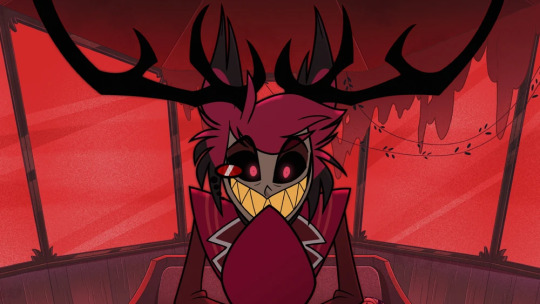

At the same time, both Stayed Gone and Hell's Greatest Dad set up important plot-points in Alastor's arc. On the one hand Vox's song implies him and Alastor have some unfinished business. On the other hand Lucifer's song foreshadows some deeper conflict going on between Alastor and the King of Hell. What is more, the song frames the Devil and the Radio Demon as intertwined characters.
This last point is made clear by both Dad Beat Dad and Hell's Greatest Dad referencing the Pilot multiple times.
1-Hell's Greatest Dad references Inside of Every Demon is a Lost Cause in three ways:
Alastor changes the surroundings by using neon lights, like in the Pilot
Alastor dances with Charlie in the same spot they dance in the Pilot
Lucifer summons a slot machine, like Alastor does in the Pilot
2-Both in Dad Beat Dad and in the Pilot, Alastor is trying to win Charlie's favor and to steal her away from a loved one. In the Pilot he does so with Vaggie, whereas in the episode, he gets in Lucifer's way.
3-Both the Pilot and Dad Beat Dad have a character explain Alastor's backstory:
Vaggie: He began to topple Overlords who have been dominant for centuries. That kind of raw power had never been harnessed by a mortal soul before. Then, he broadcast his carnage all throughout Hell just so everyone could witness his ability. Sinners started calling him "The Radio Demon" (as lazy as that is). Many have speculated what unimaginable force enabled him to rival our world's most ancient and destructive evils.
Mimzy: He appeared in Hell suddenly, making a splash quicker than anyone had ever seen. At first, people wanted to dismiss him. but soon, overlords started going missing, and not small ones neither. We're talking heavy. hitters. No one knew what happened to 'em, until these strange radio broadcasts started going out. All you could hear were screams. Every time an overlord went missing, there'd be a new voice screaming in the broadcast! That's when Alastor revealed himself as the radio demon, and anyone that would mess with him… well, let's just say, his broadcasts never lacked new voices.
Why are there so many connections between the two episodes? It is to cement Lucifer and Alastor's foiling. For example, it is telling Alastor gets major focus in Lucifer's debut episode. Not only that, but all these calls back reveal their bond has been prepared and foreshadowed since the pilot:

Alastor looks at the Morningstar Family's portrait and narrows his eyes in the Pilot.
This is why the Pilot itself is full of phrases Alastor says that are given to Lucifer in the series proper:
Alastor: Well, I'm starved! Who wants some Jambalaya?
Lucifer: Sooo.... Who's up for pancakes?
Alastor: Yes, sir! This is the start of some real changes down here! The game is set! Now… Stay tuned. Hahaha…!
Lucifer: Come on, little lady, why the frown?
In the last 10,000 years
You're the first one to change this town!
Alastor: After all, the world is a stage and the stage is a world of entertainment.
Lucifer: The stage is wrecked, the crowd is gone
But by God, Charlie!
The show, it must go on!
Basically, the Radio Demon and the Devil are incredibly similar, to the point that they convey the same ideas in opposite ways. In particular, the Pilot tells us what their shared arc is gonna be:
Alastor: Hahaha, why does anyone do anything? Sheer, absolute boredom! I've lacked inspiration for decades. My work became mundane, lacking focus, aimless! I've come to crave a new form of entertainment! Hahaha!
Alastor and Lucifer are at their root two artists who are uninspired and find new drive (for different reasons) in Charlie's big lofty dream. The ways they will approach this journey and where their foiling will go is left to be seen.
FORESHADOWING
Hell's Greatest Dad has some foreshadowing for The Show Must Go On:

This frame and Lucifer's line about him charging sacrificial lambs for his help hint at how the final battle is gonna go. Dazzle, who plays the sacrificial lamb in the song, dies, which frees Lucifer from his pact with Heaven. As a matter of fact Lute kills a Hellborn, which goes against the rules, so Lucifer intervenes and saves his daughter. In short, Lucifer helps Charlie in exchange for Dazzle's life.
Here it is everything I can think of when it comes to this song! I hope you like it :) and thank you for the ask!
#hazbin hotel#hazbin hotel meta#lucifer morningstar#lucifer hazbin#alastor#alastor hazbin#my meta#dallina17#asksfullofsugar
35 notes
·
View notes
Text
Soobin's MBTI and what it actually means

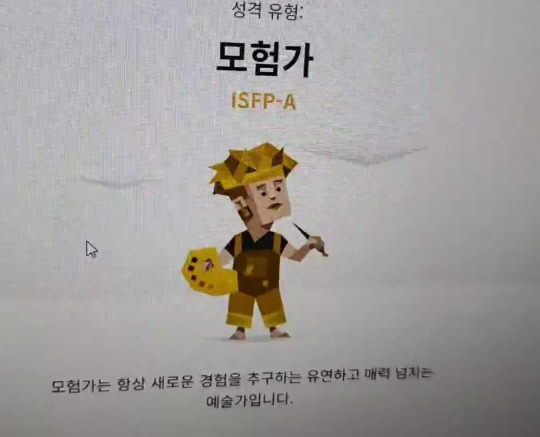
So Soobin went live today and retook the MBTI test, and he's an ISFP-A! Since he took the test live we actually have a record of his MBTI trait percentages, his responses, and even his thoughts on some of his responses. I thought it would be fun to do a little breakdown of his results and what they really mean from a personality psychology perspective! (Full disclosure: I am a research psychologist-in-training so I'll be applying what I know from my irl experiences.)
DISCLAIMERS: I don't know Soobin personally so all of my analyses will be based on his answers to the test as well as how he presents himself in public, such as lives, interviews, variety show appearances, etc. Also I am not affiliated with 16Personalities so I can't say with 100% certainty which test items are linked to which traits, and I don't know how their scoring system works, but I can make informed guesses based on my experiences with other personality tests.
Let's begin!
Prologue: The 16Personalities Franken-MBTI
For this case it's important that we talk about the version of the MBTI that Soobin took and how it works. He took the 16Personalities test, which is not the official version of the MBTI; that would be run by the Myers-Briggs Company (whose website is down as of this writing). The model of personality used by 16Personalities, called the NERIS model, is actually Frankenstein-ed from two different personality models - something they admit themselves in the theory section of their website:
With our NERIS® model, we’ve combined the best of both worlds. We use the acronym format introduced by Myers-Briggs for its simplicity and convenience, with an extra letter to accommodate five rather than four scales. However, unlike Myers-Briggs or other theories based on the Jungian model, we have not incorporated Jungian concepts such as cognitive functions, or their prioritization. Jungian concepts are very difficult to measure and validate scientifically, so we’ve instead chosen to rework and rebalance the dimensions of personality called the Big Five personality traits, a model that dominates modern psychological and social research.
Let's break down the two models used here.
The first is, of course, the Myers-Briggs Type Indicator, developed by Katharine Cook Briggs & Isabel Briggs Myers based on the work of Carl Jung. Classical MBTI is not based on personality traits but on cognitive functions, which are different ways of processing information around us: for example, the thinking function refers to the use of logical reasoning, while the feeling function refers to the use of value judgments. The goal of classical MBTI testing is to figure out which cognitive functions you use: which you default to, which helps your default, etc. This collection of cognitive functions is called a "stack," and your four-letter type tells you what the stack is made of.
The problem with cognitive functions is that they're virtually impossible to validate scientifically (even typologists can't agree on what a cognitive function is exactly), which is why they've fallen out of favor within mainstream research psychology. I don't know if the official MBTI test uses them (since their website is down I can't check), but plenty of unofficial MBTI tests don't, instead preferring the trait approach we're all familiar with. Are you introverted or extraverted? Are you a thinker or a feeler? etc.
This approach has its own issues (which I touch on a bit here), but it's the approach that 16Personalities also uses. Which brings me to the second model they use...
While the 16P test looks like MBTI, its content is actually based on the Five-Factor model, also known as the Big Five. The Big Five is actually a really good model with lots of scientific research to back it up, and (full disclosure!) it's my preferred model of personality. The premise behind the Big Five is that even though there are hundreds or even thousands of ways to describe human personality - just open a dictionary and look at how many words can be used to describe people - there are underlying patterns in our descriptions. For example, a person who is honest will most likely also be trustworthy. A person who is gregarious will most likely also be friendly. And so on.
By collecting real-world data from people in different cultures and using some special statistical techniques, researchers like Paul Costa & Robert McCrae were able to uncover these patterns as five personality traits: openness to experience, conscientiousness, extraversion, agreeableness, and neuroticism. (More on those later.)
I want to emphasize here that none of these personality traits are inherently good or bad. They can be bad in extremes, but the vast majority of people don't fall on those extremes anyway, and being high or low in a certain trait has its advantages and disadvantages. Your score in a trait can be good for some things, but not for others.
In the 16P NERIS model, each letter in your type corresponds not to a classical MBTI function, but to a Big Five personality trait. To make up for the fact that the Big Five has (duh) five traits and MBTI only has four, a fifth letter in the type was added. The resulting test from this is what Soobin took today.
Soobin's results, a Big Five perspective

Here I'll be looking at Soobin's results for each of the 16P traits and discussing what they mean. I'll support this with his responses to the test items (credits to translatingTXT on twitter for saving all of them), as well as things he's done or said publicly in the past.
Introverted/Extraverted
In classical MBTI typology, introversion/extraversion actually refers to your orientation when processing information: an extraverted orientation uses the external world (such as real-world rules and norms) as a frame of reference, while an introverted orientation uses the internal world (such as your personal beliefs and interpretations). But in the modern sense - including in the Big Five - this trait refers to the kind of energy you seek in the environment. This includes sociability - the social environment that you seek - but it also includes how stimulating your environment is overall. Extraverts are generally energetic and like stimulating environments, and are also more prone to positive emotions like joy and excitement.
Soobin scored 74% Introverted, and he's an introvert through and through; he likes being by himself and doing his own thing, and he finds social situations exhausting. But I also think that he's a great example of personality traits being different from skills. Sure, Soobin's an introvert, but he's got really good social skills; his personality probably means that these skills don't come as naturally to him, but he's still capable of learning them. He probably learned a lot during his time as Music Bank MC, and he's not afraid to go up to people and talk to them for life advice. And even though leadership isn't something he prefers especially compared to an extravert (see his answer below), it's clear that the members respect him as a leader and seek him out for help.




Observant/Intuitive (Openness to Experience)
In classical MBTI, this aspect of personality is called Sensing vs. Intuition, and refers to your use of two different cognitive functions: sensing refers to reliance on the five senses for information, while intuition refers to reliance on inner meanings and hidden symbols. The NERIS model reworks this into Observant vs. Intuitive (neither of which start with S or N, I know) to better fit the Big Five trait that their version is based on: openness to experience.
The trait of openness reflects a person's attitude towards things that aren't necessarily grounded in day-to-day reality - the abstract, the unconventional, the creative. People high in openness enjoy abstract ideas and intellectual pursuits, are often creative and imaginative, and don't mind ambiguity. People low in openness prefer things that are conventional and concrete, want things to have straightforward utility and a clear message.
Soobin's score is 64% Observant ("observant" here meaning low openness) - generally he prefers conventional, but I think he's close enough to a 50% average to say that he isn't purely a practical guy. He is, after all, an idol - people high in openness are often drawn to artistic pursuits, which includes music and performance. He has mentioned being interested in artistic things, like wanting to play the electric guitar.
But while Soobin definitely has a level of artistic interest, he seems more content in enjoying what he knows rather than expanding, and he's pretty secure in what he likes and dislikes - and I think this is where his Observant score comes in. Like, this is a guy whose favorite song in his own discography was Our Summer for the longest time before it was dethroned by Skipping Stones. He's also mentioned that he only participates in songwriting when the topic interests him, but isn't necessarily invested in it as a craft:
"I participate in writing the lyrics if the theme interests me. The tracks in this album [Temptation] all have interesting themes, you'll see when you get the album and see the lyrics too. They all have topics that I personally think and imagine about my life, so I participated in the lyric writing this time." (The Name Chapter: Temptation Recording Behind the Scenes)


Thinking/Feeling (Agreeableness)
I struggle with interpreting this one because I'm not exactly sure what the NERIS version of this trait is trying to measure. In classical MBTI (as mentioned above), the thinking function is about processing the objective content of information (logic, truth value), while the feeling function is about processing its subjective content (e.g. how well it conforms to certain values). The version of T/F commonly seen in pop-psych is "head or heart" - do you make decisions based on just the facts or on your feelings? But psychological research shows that this is a false dichotomy - we rely on our emotions to help think through things, and they often provide us with useful information. Happiness tells us things are going well, fear and anxiety tell us something is threatening us, and so on.
Nevertheless, NERIS tries to incorporate elements of this together with the Big Five trait it's drawing from, agreeableness. While extraversion is about how well you fit into social situations, agreeableness is about how you treat people in them. People high in agreeableness try to live in social harmony by getting along with others and practicing virtues that make things easier for them. People low in agreeableness might come across as abrasive, but they're also less sensitive to hate from others and more willing to take actions that might be unpopular.
Soobin's score is a 54% Feeling ("feeling" here meaning high agreeableness), and here we see the limitations of trait-style MBTI. The dichotomous nature of a trait hides what's going on; Soobin uses Feeling on paper, but in reality he's in the middle. This should be more apparent when we look at his responses and how he acts around others.
His agreeable side seems to come out more often when it comes to his circle of loved ones: his friends and family, the members, and MOAs. He's not afraid to show kindness and gratitude towards them and is touched when they do the same for him. One of his motivations for being an idol is wanting to give love to fans and appreciate the love they give back, and he clearly treats the idol-fan relationship as a special one.
On the other hand, Soobin has no problem brushing off or even standing up to haters, and he's said that he has no intentions of trying to please people who dislike him. A person higher in agreeableness (or Feeling, in this case) would be a bit more concerned about trying to appease them.
This in-the-middle mix of agreeableness is, honestly, a pretty good thing to have in a leader or an idol. You need a healthy amount of it to express love for your members, your staff, and your fans. But you also need a thick skin to withstand unfounded criticism, as well as a tolerance for conflict even when it's socially unpleasant.

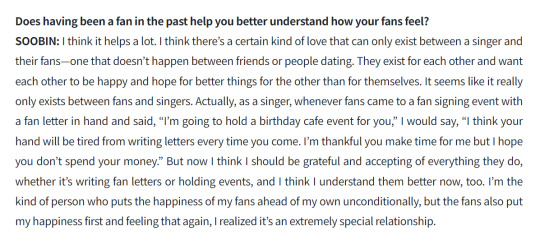
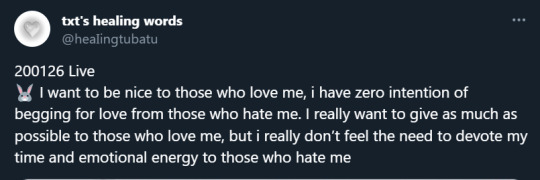
Judging/Prospecting (Conscientiousness)
In classical MBTI, this dimension is called Judging/Perceiving. It's not a pair of functions but instead a reference to help you figure out the functions in your stack: thinking and feeling are judging functions, sensing and intuition are perceiving functions. Like with S/N, NERIS renames this into Judging/Prospecting to better fit the Big Five trait it's drawing from, conscientiousness.
The trait of conscientiousness refers to one's ability to get things done and follow things through. People high in conscientiousness like to plan things in detail, are organized and goal-oriented, and generally finish what they start. People low in conscientiousness are more spontaneous and adaptable, dislike routine, and prefer to go with the flow.
Soobin's score is 86% Prospecting ("prospecting" here meaning low conscientiousness). I feel like this trait is harder to see for idols because they're always on company-mandated schedules of activities, but a really good example of this trait in action is his vacation in Japan vlog. Planning an itinerary doesn't come naturally to him, and he's okay with not following a strict sightseeing schedule so that he can relax more. For example, Soobin and his friend plan to go straight to an onsen on the second day of their trip, but they oversleep and have no problems changing their plans to just shopping and eating. They do get to the onsen eventually, but they're in no rush to. At one point in the video he even mentions his P trait as why planning is so hard for him (his score at the time was 96% P).
"This is my first time planning a trip abroad by myself. I boarded the plane myself, moved around, booked the hotel and planned everything myself. [...] Whenever I take an MBTI test I get like a 96% P, I didn't realize traveling was so hard." (15:47 - 16:39 of video)
This Weverse magazine quote also captures his spontaneous approach towards activities pretty well:



Assertive/Turbulent (Neuroticism)
This trait is exclusive to the NERIS model and was added to the four existing letters of MBTI to accommodate the additional trait of the Big Five. My biggest criticism of the NERIS model is that it treats A/T as an accessory to the other four traits instead of a trait of its own; ISFP-A and an ISFJ-A are treated as different types, but ISFP-A and ISFP-T are variations of the same type. It's not uncommon for people to leave out their A/T score when they talk about their 16Personalities results.
A/T is based on the Big Five trait of neuroticism, which is just as important as the other four - it predicts depression and anxiety disorders, for example. This trait reflects how we handle negative and stress-inducing events; people high in neuroticism feel stress easily, are prone to negative emotions like sadness and anxiety, and are more likely to self-criticize. People low in neuroticism might feel stress less, but might have a harder time registering risks and threats.
Soobin's score here is 65% assertive ("assertive" here meaning low neuroticism), again close to the average but with a leaning towards the low side. Again, this isn't an easy trait to observe in idols because a lot of the processes and actions associated with it are private and internal. But it does crop up from time to time, usually in per-performance nerves and jitters, but Soobin has mentioned that he's not the type who gets nervous easily. His answer here on how he handles stress also reflects this trait:
"I'm optimistic if you put it nicely, or some could say I'm shallow. So even if I get mad, I forget it quickly and easily. I believe that time will solve everything. So it's either the case gets resolved or my emotions die out, making me struggle less. I just think like that." (11:44 - 12:04 in video)
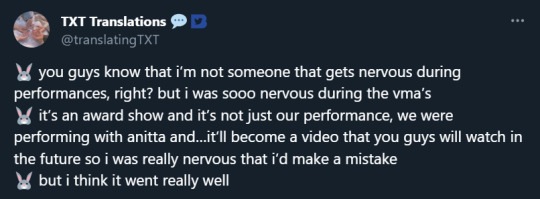

He's also not too critical of himself, which is pretty valuable in a profession where you're subjected to constant criticism as early are your trainee period. Not that Soobin is blind to his flaws; rather, he's not the type to get too worked up about them.
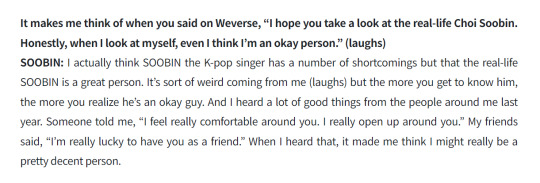

Final Thoughts
The major flaw of personality systems based on type (like classical MBTI and NERIS) is that the nuances of one's behavior are often lost in an easy-to-remember acronym that puts people into strict categories. The Big Five in its original form refers to the traits as continuums - you can be low, average, or high in a trait, often reflected as a percentile ranking based on how you compare to other test-takers - but even then, you don't see things like context or learned skills that may or may not match up with one's personality.
I've tried to untangle Soobin's personality here not just based on a catchy acronym type, but based on what those traits actually mean, how high or low they actually are, and on how they appear in context. I hope this little analysis will give a bit more insight not just on Soobin himself but also on how personality works!
—
tags for those interested: @goldennika @starburstfloat @mazeinthemoon @huenation
#soobin#txt soobin#tubatu#also sorry for any typos or incoherent bits i did not proofread this lol#feel free to ask questions and i can explain!
39 notes
·
View notes
Text
i find the whole ‘lucifer represents femininity while michael represents masculinity’ thing so interesting because like from a non-white perspective it’s the exact opposite. michael’s the quintessential female/sister figure in any asian story— runs the proverbial house with an iron fist, filial piety to the power of a billion, raises the kids, overlooked by the dad figure, doesn’t rebel, doesn’t question anything, the likes. meanwhile lucifer’s the quintessential male figure— he’s allowed to argue and rebel (created for it, in fact), he’s the father’s (creator’s) favourite despite being the one to oppose and challenge him, and he has a level of free will and freedom that michael never has/gets. this isn’t even considering the whole ‘lucifer parallels chuck while michael parallels amara’ theory (which im unsurprisingly a fan of) and the whole ‘sam (lucifers vessel) is chuck’s favourite punching bag’ thing vs ‘chuck has a psychosexual obsession with dean (michael)’ thing which brings up plenty of opportunities for a jungian/freudian examination of all this
idk it’s so so so fascinating how individual cultural experiences revolving around race and gender can shape these kinds of things. also not discounting the conflicting imagery of all this (for example michael being associated with fire, classic yang symbolism, while lucifer’s associated with ice, which is yin. but at the same time lucifer’s a very active character and associated with light while michael’s incredibly passive, which are yang and yin traits respectively) and how multiple interpretations can be true at the same time i just think psychoanalysing angels through the lens of gender (and lack thereof) is neat :)
#kind of vaguely ish connected to my last post about michael being an asian daughter lol#may or may not pull out the ego and the id and properly make this freudian this post was inspired by reading iphigenia at aulis again#but the vibes are there#and also just watching asian tv again and just thinking how interesting it is that the gender roles are so different at times#and both michael and lucifer have male and female vessels so#ygm?#idk this isnt coherent but i needed to get it out#spn michael#spn lucifer
109 notes
·
View notes
Text

Art: Dante’s Inferno illustration by Gustave Doré
* * * *
Jung said that to be in a situation where there is no way out or to be in a conflict where there is no solution is the classical beginning of the process of individuation. It is meant to be a situation without solution: the unconscious wants the hopeless conflict in order to put ego consciousness up against the wall, so that the man has to realize that whatever he does is wrong, whichever way he decides will be wrong. This is meant to knock out the superiority of the ego, which always acts from the illusion that it has the responsibility of decision. Naturally, if a man says, “Oh well, then I shall just let everything go and make no decision, but just protract and wriggle out everywhere,” the whole thing is equally wrong, for then naturally nothing happens.
But if he is ethical enough to suffer to the core of his personality, then generally, because of the insolubility of the conscious situation, the Self manifests. In religious language you could say that the situation without issue is meant to force the man to rely on an act of God. In psychological language the situation without issue, which the anima arranges with great skill in a man’s life, is meant to drive him into a condition in which he is capable of experiencing the Self, in which he will be inwardly open to an interference by the tertium quod non datur (the third, which is not given, that is, the unknown thing).
In this way, as Jung said, the anima is the guide toward the realization of the Self, but sometimes in a very painful manner. When thinking of the anima as the soul guide, we are apt to think of Beatrice leading Dante up to Paradise, but we should not forget that he experienced that only after he had gone through Hell. Normally, the anima does not take a man by the hand and lead him right up to Paradise; she puts him first into a hot cauldron where he is nicely roasted for a while.”
Marie-Louise von Franz, The Interpretation of Fairy Tales
[Centre of Applied Jungian Studies]
#Gustave Dore#Marie-Louise von Franz#The Interpretation of Fairy Tales#Centre of Applied Jungian Studies#quotes#no way out#Dante#The Inferno
17 notes
·
View notes
Text
[ELDEN RING GRAND THEORY REVISION 2.1- SUBJECT TO INQUIRIES AND FURTHER REVISION]
*i started putting the narrative of the game through the lens of Alchemy. it's started to make a lot of sense to me. this will be my personal grand theory for the DLC. Basically, the world of Elden Ring is affected in every aspect by Messmer and he is talked about in a way through the game and in interviews that doesnt really allow someone to actually throw a wrench into it, thus far*-------
The Narrator in the newest trailer opens with the line, "Pure and Radiant, he wields love to shrive clean the hearts of men.. There is nothing more terrifying." and frankly every aspect of Miquella's role in the Golden Order is terrifying from his perspective. He had to pass judgement in blessing others, which alone can be enough to break someone. It is from here that we may see part of Miquella's original reason in creating the Haligtree. At some point, Miquella became St. Trina to guide followers to the Haligtree. Knowing Miquella is St. Trina, it is possible to extrapolate on Messmer's identity when applying the concepts of Alchemy and how it translates to a classical understanding of Analytical Psychology. a lot of this speculation also ties back to extensively studying the world of the game, as well as a bit of real world religion, history, and even learning to cross-reference in-game crests and murals:--
We must first establish that literally anything not understood in a binary in Elden Ring actually confounds and terrifies followers of the Golden Order. It in fact worries Corhyn so deeply that he refuses to believe Goldmask as he grovels in the ashes of the Erdtree-- One of the biggest revelations in the entire game is premised around breaking a binary that was never proven to be a binary at all. In other words, the entire Golden Order is based in dichotomies and binaries and there is a fundamental flaw in that regard; it disregards the individual and non-binary aspects of the World to force them into a simpler mold that was going to fall with time, regardless.- Much like with Gwyn's plight in Dark Souls; it was never about the people of the land with him, it was about preventing a coming age and clinging onto whatever control found in preserving the current one forever.
At the basis, St. Trina and Miquella may have shared one body but two identities because of having been born of a single-bodied Rebis, or at least as the Golden Order sees Marika/Radagon, a God. this is an ability only demonstrated by Marika that Malenia seems incapable of. I believe her bestowment from the outer god of Rot is the reason for her lack of other personal identities; she does not have any others to project other than what she is, due to societal perception of her bestowment/affliction and her choice to let miquella ascend to the role she could also be in. In the current age, all she has been doing is dreaming (note: st. trina) and awakens promptly when we arrive; likely to the only movement of air she's felt in ages
I think Miquella is the entity of purity while St. Trina is a Lunar Reflection; the Albedo, or an Animus in Jungian Psychology, which has heavy ties to alchemy. She's the hero and protector of the people thar Miquella often envisions within. Messmer, residing in the shadow realm, represents a deep seated truth within Miquella- a sort of "Cognitive Rubedo" if you will, or a "Truth in the Mind" that he hates as much as others fear, and that nobody wants to be found. part of this truth must be Marika's fault, and it has left Miquella with a personal guilt that has torn at him so badly that eventually, a Shadow of himself tore away and became its own monster from Within.
Imagine it like this; if St. Trina is Miquella's image of theirself as a blessed, pure caretaker and a sort of christ-like figure, then Messmer is the part of him that represents "The Sins of The Father." Marika's own rise to power and established order themselves are what shaped a young Miquella. It was with time and between his noted brilliance and ability to "compel affection," that he found a way to break free of his fated identity which meant breaking free of the Order itself.
Applying the Realm of Shadows to this "Within," having been physically separated from the lands between by Marika's own mischievous deeds, it is likely that the shadow realm now acts as a cognitive realm of Marika's, of sorts, which could absolutely contain the perception or persona of another person within it. (think Mementos from Persona 5, lol)
So.. Without the current Elden Ring there would be no Order, but the current Order hides a serpent at the central intersection, which seems to represent Messmer. this is the same concept as how a pentagram represents a human, and humanity, while being inverted it represents a goat, or in many cases, Baphomet. Baphomet is labeled as half-human, half-animal, male and female, good and evil.. he is referred to as a man but is essentially every binary and every dichotomy that arises from them. He is even seen as both a deity and a demon. I believe Miquella and Radagon's work on discovering the Law of Causality is the main hint toward Messmer's presence, which ties into the rest of the alchemy involved. He is a pagan cult deity who represents balance and neutrality, and is almost always depicted doing a gesture signifying "as above; so below" which is a condensed version of the Law of Causality, already known to be associated with Miquella and Radagon, well before the Shattering; "Causality is an influence by which one event, process, state, or object contributes to the production of another event, process, state, or object where the cause is partly responsible for the effect, and the effect is partly dependent on the cause."
For clarity's sake, because i figure i'll be asked if not addressed: It's not impossible for Messmer and Miquella+Malenia to have all been the first child of Radagon/Marika with this Theory. Malenia was a twin born at the same time as Miquella, so she would be a first child with Miquella. If Messmer is a diety representing neutrality or, as I expect, a product of the Law of Causality, then he would be a product of Miquella as much as Miquella is of him. this idea lends to the possibility of Miquella actually being the remainder that was left over from a splitting where Messmer's counterparts (possibly both Miquella and Malenia, given their twin nature) are representative of his own aspects.. it does is beg a sort of "chicken or egg" paradox, but before we had a realistic answer to that, many would reply- and almost sarcastically, if not for the fact that it was the best answer we had- that the first thing to appear was "the Universe." The modern answer is, in fact, that the egg came first. (whether any of this analogy alludes to the actual lore or not is something i think we'd just have to wait for the expansion to know)
Marika herself had this Shadow hidden away, and this presents rather well because we know that there was a long period of time after the Night of Black Knives that Marika was still active but becoming more distraught, preceding the Shattering. on top of this, more proof resides in that, within Jungian psychology, it is that one's Anima/Animus comes to them in dreams, much like St. Trina came to people in theirs (who, as an Animus herself, was probably motivated by helping malenia look for her Anima, which perhaps never existed). It is also true that a Shadow Persona is borne of conflict tearing at one's conscious until it becomes its own entity, which i've already presumed of Messmer above.
#elden ring#lore#shadow of the erdtree#alchemist#alchemy#messmer#miquella#malenia#st. trina#messmer the impaler#miquella the unalloyed#malenia blade of miquella#theory#theorycrafting#narrative analysis
14 notes
·
View notes
Text
IT(S) — Introverted Thinking supported by Sensing
Intellectual heaviness, obsessive thoughts, depressiveness. serious attitude towards duties. Disciplined. Loves tinkering, creating. Honesty, modesty, diligence. serenity. Few contacts Minor reasons bring excitement. Sadomasochistic person. Prefers to act quietly, systematically. and rationally. In their mind, the world is organized in a logical manner (according to their own intellect, they design a structure of tangible reason and apply it in reality). These people respect discipline and order. They are often advocates of strong power. Leaders and managers of small teams that accurately and timely complete work or study assignments. This type is often someone that thinks, gets into their mind for a time, in order to rationalize things. They create a set of standards and rules, but may not follow them properly, they are subjective. Some manifestations are religious. he can be mess and confrontational. extremelv pick or "a monkev with a smart brain". If he ever gets bored, he won't seek solitude and try to study mathematics or philosophy, for example. No, in his boredom, he seeks human contact, pleasure, he tries to gain adrenaline, motivation, power. He seeks to dominate, but may also like to be dominated. He doesn't value common sense; he won't learn things that he judges useless. Efficiency and usefulness are dictated by his own standards, no society can make him agreeable on this. Subjective and stubborn, obsessive, has many compulsions. Likes fights and movement, not interested in being quiet; so he is either actively thinking, with direction, or provocating, trying to make action. Representatives of this type are often blamed for being emotionally deaf and impervious. For example, they are rarely capable of feeling the mood that prevails in a group of people. They may joke around and make fun of people, point their errors and mistakes, debate, argue with everyone. Not able to pick social cues, and some manifestations are rude as fuck; "Shut up! You are thinking, and your thinking is ANNOYING ME, so you shut up!". He openly expresses his desire. Some manifestations often think too much of themselves, they demonstrate superiority, seriousness, intellectuality, rational behaviour. Their voice sometimes is infused with this sentiment of self-righteousness; he talks polite and complicated. They prefer to build their relationships with people on the effect of admiration. Representatives of this type can hardly listen to and. moreover. accept even constructive criticism. He thinks. "I am the most rational and logical here, so he keeps a conclusion; "Everyone here is dumb, and I don't need to consider their opinions or reasoning
The weakness of intuition can be seen in their tendency to fight "extra" information and to hold onto one previously formed opinion. They consider discussions and debates to be unnecessary squabbles that interfere with doing work. If they are told about their flaws, even very tactfully, they can keep a grievance and take revenge on a person given the occasion. Some manifestations, though, have an interest in the "change". They can perceive some useful consequence, some outcomes, routes for the future. If someone states something around this type, he might ask you to explain. He needs explanations. He won't consider anything if those things lack explanations. He can be adaptable and "social", funny, but this kind of behaviour easily disappears if something within his principles is damaged. Independent of external circumstances to a marked degree, with a singleness of purpose that subordinates the social and emotional aspects of life to some long-term achievement of the mind. He has a vested interest in the military, applied science, and the field of mechanics. May be political. Carries the greatest understanding of visible and tangible properties of matter, the qualities of an object. He knows very well all the properties of a tool; how it behaves, its solid and primordial substance, what you could do with it, what you should do with it. He studies and learns scientific principles, he understands the rules and knows how to explain everything, and he knows how to find use of it, how to apply the knowledge. He holds the logic of design, a thorough reading of directions or drafts, securing the structure that has proven to work, stubbornly following or talking about principles and rules (his religion), logic of justification/legality, justifying one and only right consistent unified decision, "either - or" way of thinking, step by step logic, building chains of causes and effects, linear, unidirectional, strengthens compliance, confident in its infallibility. He proves things, from simple premises and multiple axioms, he creates conclusion. He is deterministic, in a sense. He pays attention to all the details and aspects of the world, he holds a sense of realism, perceives the object without impressions. He links things, creating a framework of understanding, a system of order and conduct within sensation. Some manifestations are hedonist, ego-centric, and they'll rationalize all of those behaviours. Impulsive, he does something, but then brings order and reason. "Why did you shoot the walls? Why did you step on the table?"; "Because I was bored! That's it!". "I am strong and I would be interested to fight with you".
A good place for such a person where it all like, well disposed towards him. If someone says treats him badly (for example. the wife says in her heart: "I hate you"), then takes it literally and tries to immediately get out of there, find a place where everyone will treat him well (or say that this is the case. Therefore. it is extremely ditticult to be in places where they do not Know who it belongs to him. The appearance of him as a man who tells them: "cool, man!" Is perceived as "the phenomenon of Christ to the people." It is suggestible to when they say who it belongs to him. "I want people to care about me. I want to be liked, appreciated and respected. If people here like me, then this is a good place.". Some versions does not speak much. However some representatives of this type like to talk. Their public speeches are brief, logical, and well structured. This type is hypochondriacal, i.e. suspicious in his relationships. People can influence him effectively by exploiting this suspiciousness. Sometimes it is enough to tell him that Mr. So-and-so does not like him, then he begins to "pick up" the signs of insincerity in Mr. So-and-so ... suspicion creeps in. It is easy to infuse doubts; here the person is always hypochondriacal. Maniacal suspiciousness. A paranoid suspiciousness capable to throw the whole country into the abyss of suspicion and fear. If this type fails to find a friendly company with a good guaranteed attitude, they often search for an individual way of realization where they don't depend on other people's attitudes. This type's "intuition-feelings" may invade his conscience, he gets extremely jealous, he is suspicious, he doubts the love of his partner, he worries, "did you cheat on me?", he builds hatred towards his own significant other it he ever touches another person, he thinks "I will make you mine!", he is either love or hate, and he makes his own emotions the business of everyone. He sees the possibility of someone betraying him, and then he gets explosive, oriented to humiliation. He inferiorizes anyone that might hurt him. He dislikes when someone gives him advice, he thinks "this person feels superior enough to tell me what to do?!", he always answers "DO NOT TELL ME WHAT TO DO", "I do whatever I want to do". Some manifestations are great believers of economy of effort, so they often make people do what he needs to do, he demands of his partner, "make me a soup". If they underestimate or underperform, economy of effort can come perilously to laziness, procrastination.
#personality theory#personality types#typology#cognitive functions#jung#classic jungian#it#ti#it(s)#istp
0 notes
Note
do you have any thoughts on ‘dream interpretation’ specifically? it's a definite part of psych practices and of astrology as well. it comes off as a gigantic red flag to me but I struggle to articulate very well why. is there any empirical basis for dream interpretation?
well it depends what you mean by dream interpretation. like if we're talking that kind of one-size-fits-all jungian unconscious symbolic language, that's not really the type of thing it would be easy to dis/prove empirically lol. one major problem that crops up here is a general tendency in many strains of psychoanalysis to make universal or transhistorical claims about the psyche or 'human nature' that flatten the social and historical context by which symbols become meaningful and values become adopted. ofc some schools of psychoanalysis have tried to rectify this by marrying analysis to serious materialist political commitments; whether these projects have ever been successful is up for debate but most people claiming to be practitioners of psychoanalytic dream interpretation are not doing this in any case. i have never sought out astrological dream interpretation and would be pretty sceptical of it because astrology in general is so philosophically / psychologically essentialist in general. i don't really see how the dream analysis part would skirt that issue lol.
all of that said: i think dreams are like any other thoughts in that some of them are probably very much reflective of your desires, fears, psychological state, &c. others are just you chewing on random images or ideas or stimuli you were exposed to. some are probably just you being like "hey, wouldn't [x] be cool / weird / fucked up?" you could look at a classic case like dreams about your teeth falling out: freud had lots to say about teeth and without re-treading too much ground here, we might point out that it's true people judge you (romantically, employment-wise, &c) a lot based on what your teeth look like. so, it makes sense that many people experience a lot of anxiety around teeth and it's relatively common to cook up a horror scenario in your mind about losing them. but, the specific sort of dimensions of that fear will vary a lot between individuals, cultural / social contexts, &c. i think you are probably the person best-placed to determine what your own dreams mean, if anything. i don't really see dreams as being fundamentally different from whatever else you cook up in your brain. some of it is profound and some of it is gibberish and most is probably in between.
20 notes
·
View notes